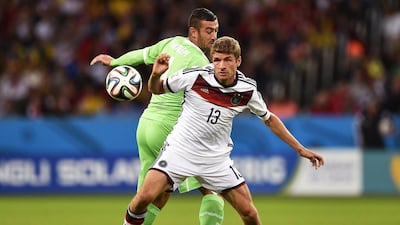It is South America against Europe. It was ever thus at World Cups. The global game has been dominated by two continents and, for all the predictions of change, the quarter-finals have a familiar look: four European nations, three South Americans and a lone interloper.
Costa Rica have confounded expectations and will have to do so again if they are to become only the third team from any other confederation to reach the World Cup semi-finals. It is something only the United States, in 1930, and South Korea, in 2002, have done.
As ever, the major honour is likely to be contested by the Europeans and the South Americans.
History suggests the locals will emerge triumphant because only Brazil, Argentina and Uruguay have been winners at the seven World Cup tournaments staged on the west side of the Atlantic Ocean.
While the Uruguayans’ victories in the deciding games in 1930 and 1950 came against neighbours – first Argentina and then Brazil – the subsequent pattern in Latin America is of a more even contest between the continents. Czechoslovakia, Italy, the Netherlands and West Germany have been the respective runners-up.
The last four in 1962, 1970, 1978 and 1986 featured an even split between old world and new.
It is likely that will continue.
Things could have been very different. Algeria, Nigeria, Mexico and the United States came tantalisingly close to reshaping the football map. Many of the outstanding displays of teamwork in this tournament came from sides historically deemed outsiders. Some compensated for their absence of superstars with unity and energy.
Chile combined both and, of all the eliminated teams, they have the strongest case to say they belong among the top eight sides.
The combination of drawing the hosts, the narrow margins when Mauricio Pinilla struck the bar in added time and Gonzalo Jara followed suit in the subsequent shoot-out condemned them to an undeserved exit.
South America can lament the way four of its five strongest sides – Brazil, Chile, Uruguay and Colombia – ended up in the same quarter of the draw. Within a continent, there has been a divide between its established powers, Brazil and Argentina, who have progressed without always impressing, and the rising powers, Chile and Colombia, who have been more vibrant.
Both have earned themselves what are in effect away games against Brazil, meaning James Rodriguez could go the way of the similarly impressive Alexis Sanchez: home, with a sense of what might have been.
There is a divide in Europe, too. Its sun-soaked southern nations departed early and, in some cases, ignominiously. The knockout stages took place without Italy, Spain or Portugal for the first time since 1974.
Farther north, France, Belgium, the Netherlands and Germany, each bordering at least two of the others, all reached the quarter-finals.
They have coped better with the heat and alien conditions, predictably in the case of Germany whose 16th consecutive appearance in the last eight illustrates their ability to prevail anywhere.
Perhaps it will prove pertinent that the Netherland’s last two finals came in Africa, in 2010, and South America, in 1978 – their fortunes fluctuate rather more, but geography may not be a factor.
That European quartet has showed indications of the depth in talent on that continent. No other confederation contains as many potential high finishers: Sweden, Bulgaria and Turkey have all reached the semi-finals in foreign continents since 1994 and none even qualified this time.
Talent, too, is the deciding factor. Rightly, many of those who departed in the round of 16 were lauded.
They ran favourites closer than expected, enhanced their own reputations and played with unanticipated panache or stirring determination.
Yet the European and South American representatives in the last eight all possess match-winners.
They had been scorers in early rounds and, in the knockout stages, players such as Lionel Messi, Thomas Muller and Arjen Robben turned creators.
Now they will slug it out for glory. As usual.
sports@thenational.ae
Follow us on twitter at @SprtNationalUAE


